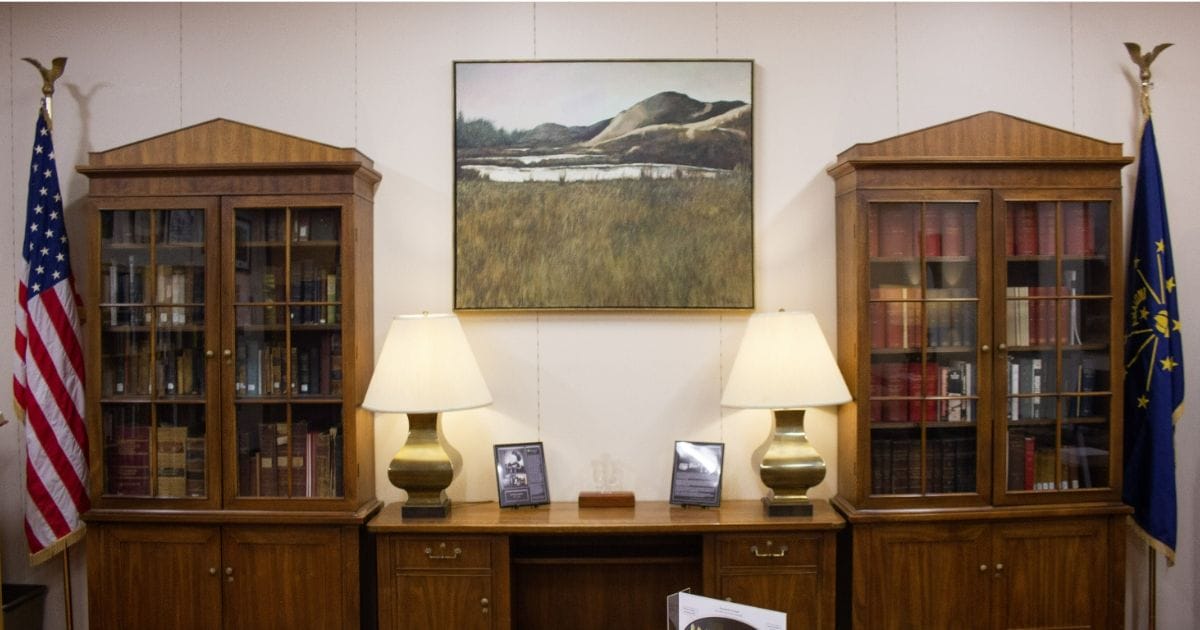Photo caption: A look inside the Madden Room at the Indiana University Northwest Archives & Special Collections.
Origin of the collections, how IU Northwest Archives and Special Collections will move forward under new name
Come celebrate the archives’ 50th anniversary:
Calumet Regional Archives 50th anniversary
Thursday, Oct. 12, 2023 at 2-4 p.m.
John W. Anderson Library/Conference Center – Third Floor
RSVP HERE.
It began as a desire to preserve Northwest Indiana history when no one was doing so.
History professors James “Jim” Lane and Ronald “Ron” Cohen saw a need and established the Calumet Regional Archives in 1973.
A simple collection of documents stored inside their offices grew into a historical preservation of hundreds of collections documenting the history of the Calumet region, City of Gary and Indiana University Northwest.
It’s served as a unique resource preserving local history and telling The Region’s story through its vast collection, thanks to its passionate staff. Fifty years later, the Indiana University Northwest Archives & Special Collections continues to serve as a free and open resource for academics, family researchers and anyone in between.
“There still isn’t anything like it in the area,” Lane said.
From one collection to hundreds: The origin of the archives
Lane and Cohen started as history professors at IU Northwest on the same day in 1970.
Over the years, the two produced a multitude of publications, but both took great pride in the establishment of the archives. Lane still serves as the archives’ co-director and Cohen did until his death in 2022.
The origin of what became the Calumet Regional Archives started as their passion to preserve local history. Early in their tenure, the two discovered the Gary Neighborhood House — founded by Presbyterians and nearly as old as Gary itself — caught on fire.
They feared the building’s records would be lost forever, so they went and collected what they could. Some documents were moldy, but they paid for them to be fumigated and brought back to their offices in Tamarack Hall.
“We found out there was literally no place in the Region that was an archive for Region papers and manuscripts,” Lane said.
Thus began their collection.
When the Lake County land transfer records, some dating back to the 1840s, were microfiched, there were talks of the original records being thrown out. Lane and Cohen took the originals. A worker invited them to take the records from the basement of the Gary City Hall, which frequently flooded. They asked then-chancellor Danilo Orescanin to ask democratic congressman Ray John Madden if he would donate his congressional papers. Not only did Madden do that, but he donated furniture, which remains in the archives in what is fittingly called “The Madden Room.”
Lane and Cohen continued to obtain more records and were eventually given a room in the Library/Conference Center. It wasn’t much, but it was better than storing a growing number of documents in their offices.
Their collection grew, but they didn’t know what to do with it. In 1982, IU Northwest’s first archivist, Stephen G. McShane, was hired.
McShane organized the collections, placed documents in acid-free materials and got documents signed over and officially donated to the university. Lane credits McShane for expanding the archives, saying “We couldn’t have grown; we wouldn’t have existed very long without him.”
During his tenure, McShane processed over 500 collections until his retirement nearly 40 years later.
After Lane and Cohen retired from IU Northwest, they continued gathering materials as the archives’ co-directors. Lane continues to produce Steel Shavings magazine, an oral history of life in Northwest Indiana, which recently published its 52nd edition.
“(The archives) is a big part of our legacy,” Lane said. “Both of us taught here all our academic lives. I put out the Steel Shavings magazine that deals with the area. That and the archives, hopefully people will remember me by.”
Today, the archives cover local political, economic and social history. It includes CDs, photos, papers, interview recordings/transcriptions and more.
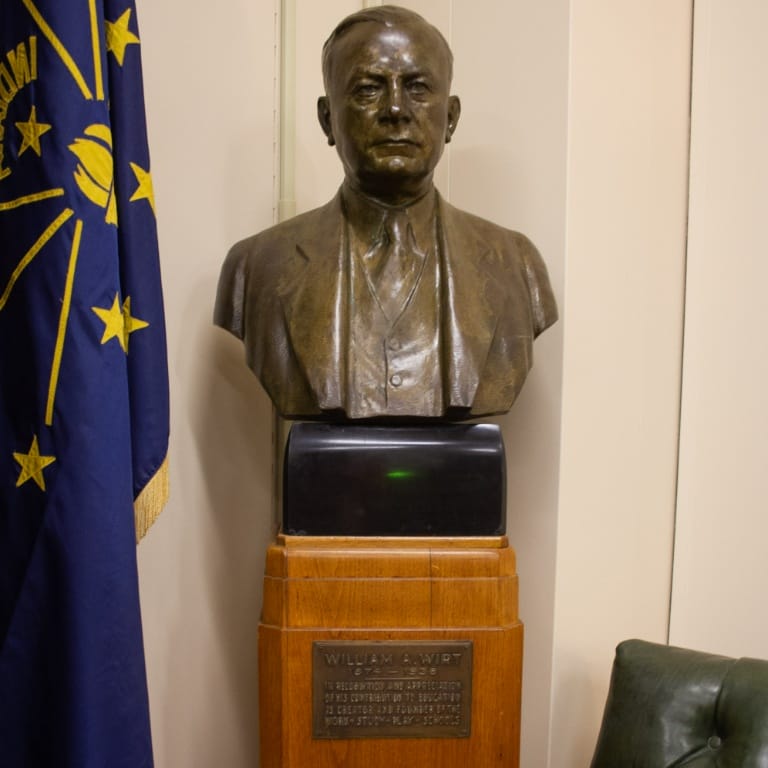
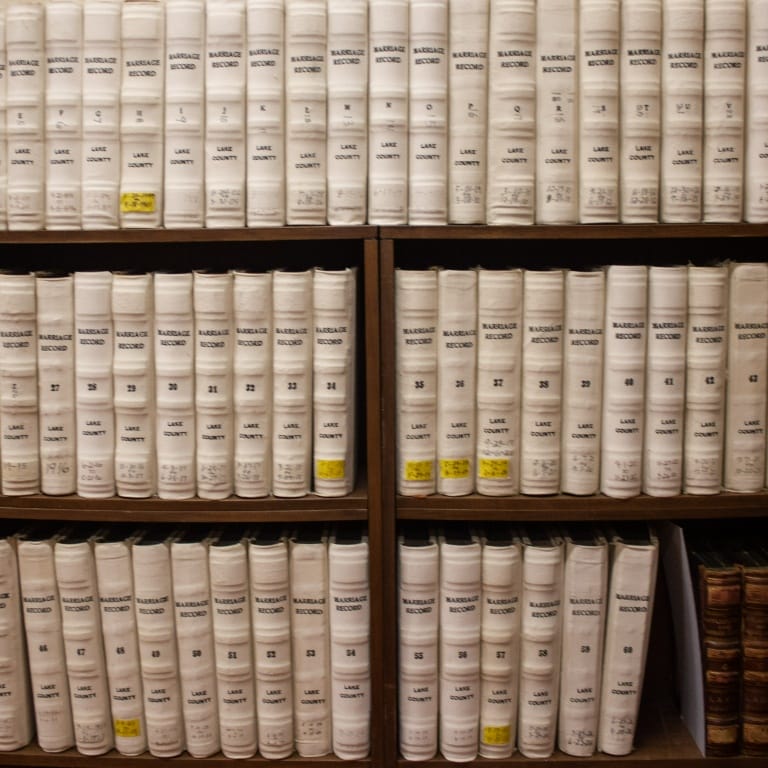
A look inside the Madden Room at the Indiana University Northwest Archives & Special Collections.
A full-circle moment for a student
One day, Mae Ellis, a student worker in the archives, had déjà vu.
A junior in the accelerated nursing program, Ellis began working in the archives last December after qualifying for a work-study program. She was working on some of the books when a familiarity came over her. So, Ellis texted her mom.
“I’ve never been to the archives at IU Northwest, have I?” Ellis said.
“Yeah, actually you have in fourth grade,” her mom replied.
The memories, at least bits and pieces, started coming back. Ellis found her fourth-grade project, a diorama on the South Shore and current IU Northwest archivist Jeremy Pekarek found her signature in the visitors’ book.
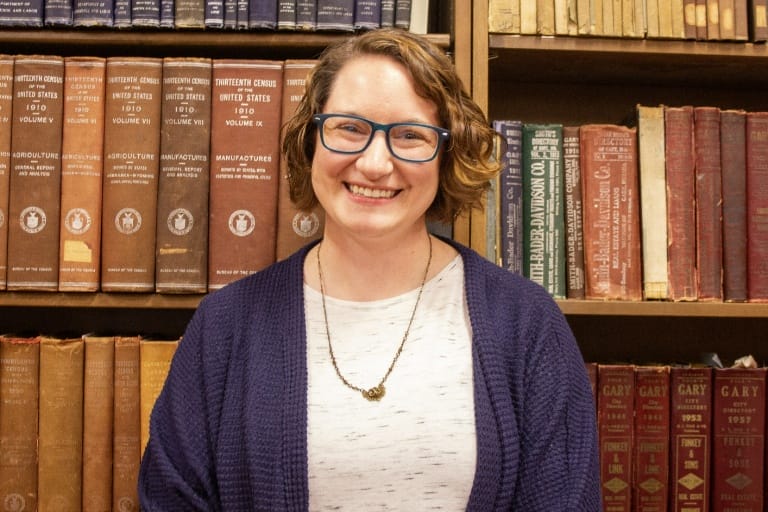
“I was helping my mom with some reorganizing in the basement in February, and I came across my paper. Now it’s been misplaced,” Ellis said with a laugh.
It was a full-circle moment for Ellis. But why does a nursing major work in the library archives in the first place? The same reason Lane, Cohen, McShane and now Pekarek do — a love for history and telling stories.
“I love working in here,” Ellis said. “It’s a lot of fun overall and I really enjoy it.”
After going to a few universities before transferring to IU Northwest — also her mother’s alma mater — Ellis has found a home at the Northwest campus and in the archives. Each day is a little different and working there has sparked a new interest.
Talking to Pekarek — who completed an internship in SUNY Upstate Medical University’s archives — Ellis discovered she could get her master’s degree and work in a medical library. She also wants to set aside some time to research her family history. She’s already found some information on her father and grandmother in city directories stored in the archives.
“I need to find a day where I can just come in and do my own research,” Ellis said. “It’s kind of cool seeing bits of my family in here. Everything is really cool.”
Future of the archives under a new name
No matter who walks into the archives, Pekarek is there to help them gather information. It’s what he’s passionate about and what the archives are for — to tell the history of the region.
Pekarek doesn’t want the archives to be seen as a storage facility where he’s the gatekeeper. He wants to share his findings and encourages anyone interested to schedule an appointment so he can help them.
“There’s a story within each collection, but what is it? And how do you allow the public to understand it?” Pekarek said. “… We want our collections to live outside the walls of the archive so people can appreciate them and understand why the region’s history is so important.”
In the past year, in addition to instructing, processing, acquiring, digitizing archives and more, Pekarek has focused on outreach and sharing the archives’ stories.
Pekarek created displays on Todd Deloney, who founded the Black Student Union at IU Northwest and had the campus adopt Martin Luther King Jr. Day as a holiday; John Eubanks, an enslaved person who fought in the Civil War and moved to Gary, where he died; Consuelo Ornelas Garcia, Northwest Indiana’s first known Hispanic nurse; and more.
“That’s what the Calumet Regional Archives is all about,” Pekarek said. “It’s about telling the story of the region in a comprehensive and inclusive way.”
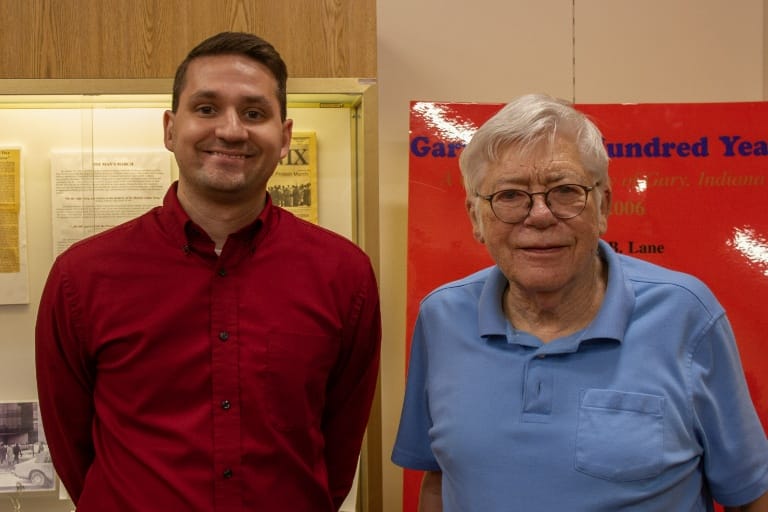
And while the archives have achieved plenty in its first 50 years, Pekarek hopes to add to the legacy built by those before him.
It’s why the archives recently changed its name to the Indiana University Northwest Archives & Special Collections. Under that umbrella, The Calumet Regional Archives will remain intact, but it will be joined by another entity, University Records, to elevate interest in donating faculty and student papers, as well.
As for the archives’ impact, Lane said that can be explained by the vast number of published books, stories and works that have used it as a resource.
Pekarek hopes to make the archives even more accessible by digitizing the hundreds of collections housed within it. The behind-the-scenes work — preservation, working on the backlog of collections, processing materials and more — by people passionate about the archives will, of course, continue.
“It’s very important to me that the CRA continues that rich legacy and that’s why we’re honoring it right now,” Pekarek said. “It’s not just a 50th anniversary, it’s 50 years of preservation and pioneer work in the field and dedicated research not only by researchers but by people involved in the collections.”
This article originally appeared on Indiana University Northwest.

